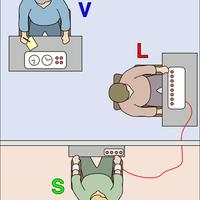Personalized learning
 This section of the site is dedicated to "learning modules." These modules are meant to be for self-directed learning in which students submit tasks (assignments) to the teacher for feedback. Please see below for an explanation of how to use this section of the site.
This section of the site is dedicated to "learning modules." These modules are meant to be for self-directed learning in which students submit tasks (assignments) to the teacher for feedback. Please see below for an explanation of how to use this section of the site.
Rationale
There are several ways that you might choose to use modules. The modules are meant to serve as self-paced learning. They could be used for:
- Online teaching. For example, you could introduce the module - or section of the module - and then have students work through the module, submitting work at the end of the class period.
- Individualized learning. Eventually, as more modules are made available, you could have students do different options and/or different topics within an option - for example, study OCD rather than depression.
- Absent students. Many of us are going to have students who will be ill or quarantined in the next year. Even without COVID, we often have students with extended absences. These students may be assigned these modules as a way to "make up" for their absences or to do individualized learning while at home.
- Revision. Finally, these modules may be used for revision. This could be over the summer, before mock exams, or as part of self-guided revision before exams.
Setting up a module
To set up a module for your students, all you have to do is to select the module that you would like your students to do and make it an assignment. If there are aspects of the module that you do not like, you do not need to assign all of the pages. You may, for example, only want to revise with students the research methods in genetics, for example. Students may continue on to the next page of the module if you make it available to them, or you could keep it hidden to control the pace at which the tasks are completed.
Assessment
There are two types of assessments in the modules. One is automatic. These are primarily quizzes, but they also include some short-answer assessments that provide answers to the students. The quizzes are automatically scored and put into your markbook (gradebook) so that you can see how the student is progressing.
The second type requires feedback from you. These include short responses, SAQs, and essay responses. There is guidance on the last page of the module identified as the "teacher guide." This gives advice on how to assess each of the tasks.
Of course, you can add other assessments using the student access features. This includes a "writing task" which may be the essay - and this allows you to annotate and give feedback to students in the Inthinking platform. You will also see that Inthinking is adding an "exam" feature, which will allow you to have students take such assessments under exam conditions.
Selected Pages

Sociocultural approach
The sociocultural approachThe sociocultural approach examines the effect of environmental and cultural factors on behaviour....

HM: Milner (1966)
Milner carried out a classic case study of the role of the hippocampus on memory formation. You can use this study for the...

Writing the IA
The material in this section of the site includes guides for writing the various sections of the internal assessment report,...

Causal patterns
We know that "correlation is not causation!" or that if we manipulate an IV and it leads to an effect on a DV under controlled...

Understanding Milgram (1963)
Even though obedience is not part of the IB Psychology curriculum, many students study Milgram's (1963) classic study as...

Rogers & Frantz (1961)
Rogers and Frantz (1961) carried out a study to see whether stereotypes could be the result of conformity to group norms....

 IB Docs (2) Team
IB Docs (2) Team
